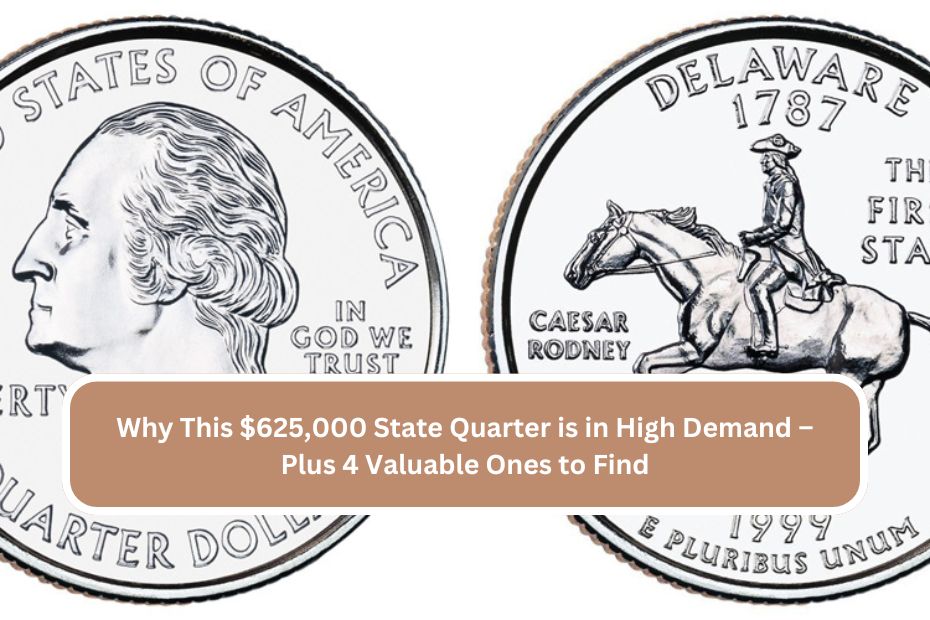Do you have a state quarter lying around? It could be worth far more than you think—one rare state quarter recently sold for $625,000! These coins, originally minted as part of the U.S. Mint’s 50 State Quarters Program, are some of the most sought-after collectibles in numismatics. Read on to discover what makes these coins so special and learn about four other valuable ones you should keep an eye out for.
What Makes State Quarters Special?
The 50 State Quarters Program ran from 1999 to 2008, showcasing unique designs representing each U.S. state. With over 34 billion coins produced, these quarters were not only a hit with collectors but also brought attention to the art of coin design.
Some state quarters, however, became exceptionally valuable due to minting errors, low production runs, or unique variations. These rare traits have made them treasures for collectors worldwide.
The $625,000 State Quarter
The most valuable state quarter to date is a rare 2000-P New Hampshire quarter with a unique minting error. Dubbed the “Spitting Horse Quarter,” this coin features an apparent die crack that gives the illusion of something coming out of the horse’s mouth on the reverse side.
- Why It’s Valuable: The combination of the error’s visibility, rarity, and public interest skyrocketed its value. In a recent auction, a high-grade version sold for a staggering $625,000.
Four Other Valuable State Quarters
Here are four more state quarters worth hunting for:
| Coin Name | Year & Mint | Notable Feature | Estimated Value (USD) |
|---|---|---|---|
| Wisconsin Extra Leaf | 2004-D | Extra leaf error in corn stalk | $100 – $7,000 |
| Delaware Spitting Horse | 1999-P | Die crack on horse’s mouth | $20 – $300 |
| Minnesota Double Tree | 2005-P & D | Double die in tree design | $50 – $1,500 |
| Connecticut Broadstrike | 1999-P | Broadstruck outside normal design | $30 – $500 |
How to Identify a Rare State Quarter
1. Check the Mintmark
Coins minted in Denver (D) or Philadelphia (P) may have unique errors. The mintmark is located on the obverse side, near Washington’s ponytail.
2. Inspect for Errors
Use a magnifying glass to spot anomalies like double dies, die cracks, or extra design elements.
3. Assess the Condition
Coins in mint condition (graded MS65 or higher) are worth significantly more. Consider sending your coin to a grading service like PCGS or NGC.
4. Compare with Known Rare Quarters
Look up your coin in online databases or coin guides to see if it matches known valuable quarters.
Why Are These Quarters So Valuable?
- Rarity: Error coins or coins with low mintage are harder to find.
- Demand: Collectors love state quarters, increasing competition and driving up prices.
- Historical Significance: The program marked a significant moment in U.S. coin history.
Tips for Collecting State Quarters
- Start with Rolls or Bags: Purchase uncirculated rolls or mint sets from coin dealers to improve your chances of finding rare coins.
- Handle Carefully: Use gloves to prevent fingerprints or scratches that reduce value.
- Store Properly: Keep your collection in coin holders or albums to maintain condition.
- Learn the Grading System: Understanding coin grading will help you assess value accurately.
Conclusion
The state quarters you carry could be worth more than you realize. With examples like the $625,000 New Hampshire quarter and other error coins, it’s worth taking a closer look at your collection. Who knows? Your next big treasure could be hiding in plain sight!
FAQs
1. How Do I Know If My State Quarter Is Valuable?
Look for unique errors, low mintage years, or uncirculated coins. Online resources or appraisers can help confirm their worth.
2. What Is a Double Die Error?
A double die error happens when the coin’s design is stamped twice, creating a doubling effect in parts of the design.
3. Where Can I Sell My Rare State Quarters?
Rare coins can be sold through coin dealers, auctions, or online platforms like eBay. Certification from a grading service can increase credibility.
4. Are All State Quarters Valuable?
No, most state quarters are worth their face value unless they have specific errors or are in mint condition.
5. Should I Clean My State Quarter Before Selling?
Avoid cleaning coins, as it can damage the surface and reduce their value to collectors.

